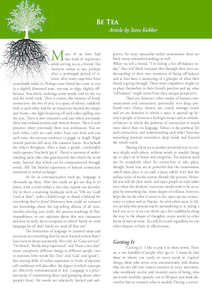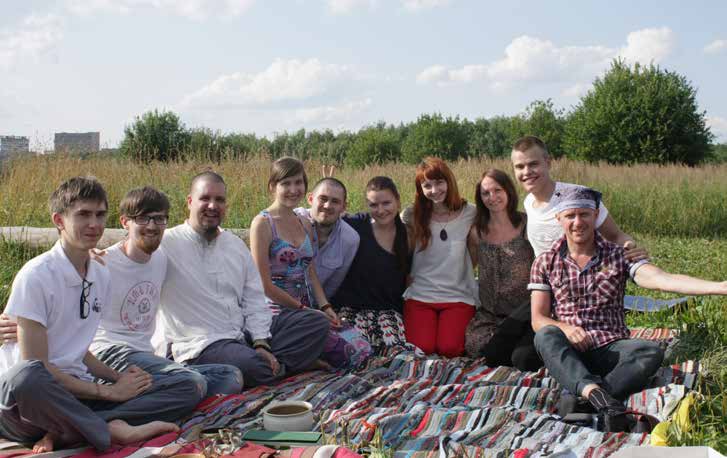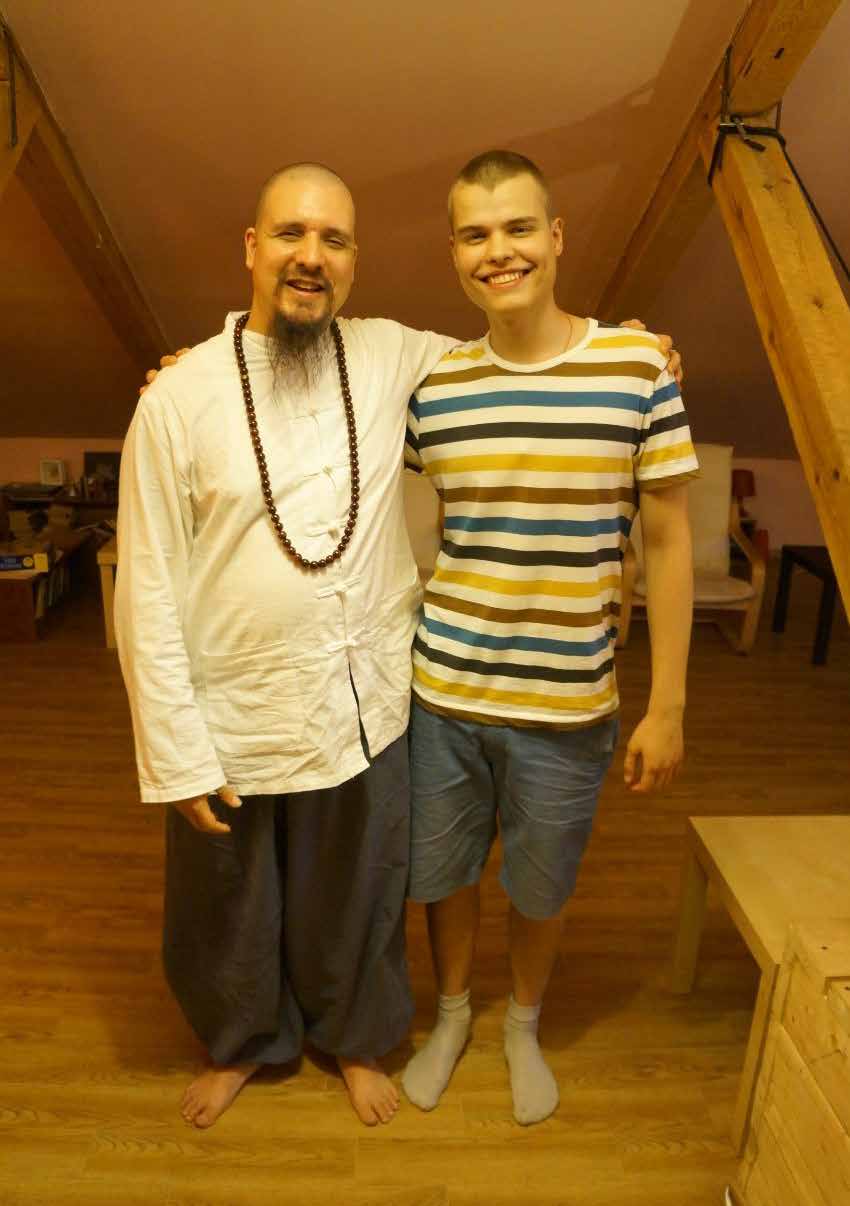
 |
|
Many of us have had this kind of experience while serving tea to a friend: The moment comes at last, perhaps after a prolonged period of silence, after many cups have been consciously taken in. Perhaps your friend has come to you in a slightly distressed state, nervous or edgy, slightly offbalance. You drink, exchange some words, and let the tea and the mind settle. Then it comes, this instance of lovely connection: the two of you, in a space of silence, suddenly look at each other and for an instant see beyond the shapes and forms - the light bouncing off each other spilling into the eyes. There is now relaxation and ease where previously there was residual tension and mental chatter. There is now presence where previously there was restlessness. You see each other, truly see each other. Your eyes lock and you each resist the nervous tendency to giggle or laugh. Rigid mental patterns fall away like autumn leaves. You behold the other's Beingness. After a time, a gentle, comfortable smile appears. You both 'get it'. There's a moment of understanding each other that goes beyond that which the mind seeks, beyond that which can be communicated through words. Ah! The blissful experience of human connection unrelated to verbal exchange!

As far as communication tools go, language is obviously up there. How else could we get our dog to sit down, wish a tired cashier a nice day, express our incredulity in front a stunning landscape with an "Oh my God! Look at that!", order a falafel-to-go or thank a beloved for everything they've done? Moreover, how could we transmit our knowledge about the top-selling albums of all time, weather-altering com trails, the ancient teachings of Padmasambhava, or our opinions about that new restaurant and how its tacky decor compares to others? Surely we need language for all that? Surely we need all that too?
The limitations of language to transmit ideas and emotions are something that far more learned writers than I have written about extensively. Not only do 'Great service!', 'I'm bored', 'Really deep experience!' and 'Have a nice day!' mean completely different things to different people (not to mention little words like 'love' and 'God' and 'good') , but varying skills of verbal expression or levels of shyness/ self confidence will also affect the degree to which concepts are effectively communicated or lost. Language is a priceless mode of transmitting ideas (and gossiping about other people's lives). Yet words are inherently limited and subjective; for every successful verbal transmission there are likely many misunderstandings as well. When we tell a friend, "I'm feeling a bit off-balance today," they will likely interpret this through their own understanding of their own moments of being off-balance and at best have a smattering of a glimpse of what their friend is going through. Those more empathetic might try to place themselves in their friend's position and see what "off-balance" might mean from their unique perspective. There are, however, other modes of human com
munication and connection, potentially very deep, profound ones. Dance, theatre, sex, touch, massage, music and art are domains in which a space is opened up between people or between a feeling/concept and an onlooker/listener in which the pathway of connection is much more direct than via language. Silence is the pathway for such connection, and 'understanding each other' becomes something attained somewhere deep inside and beyond the mind's reach.
Sharing silent tea is another potential way to connect deeply with others, without words to muddy things up, or place us in boxes and categories. Tea sessions need not be completely silent for connection to take place, though. Some teas are so powerful that the transmission which takes place is on such a deep, subtle level that the surface noise of words cannot disturb this process. Powerful teas will do their work, and open people to each other even when the drinkers' conscious minds wish to be occupied by something else. Some degree of stillness, however, helps the tea do what it wants to do: open up our connectivity to others and to Nature. As with other areas in life, we can help this process out by surrendering to it, taking a back seat to it, or we can throw up a few roadblocks along the way in the shapes of thoughts, excess words or other forms of mental noise. Tea will do its job regardless; we can either deepen or limit its effectiveness.
'Getting it'. I like to put it in those terms. There are a rare handful of people who 'get it'. I mean by that those to whom one rarely or never needs to 'explain' things, those who never, even unconsciously, seek drama, who do not fall into instant reaction to every statement, who wordlessly receive and transmit states of being, who use words carefully, sparsely, not to fill space and mask discomfort but to transmit what is needed. During a conversation, they resist the mind's tendency to stop really listening to what the speaker is saying and fill in the blanks, or to interrupt with an opinion, fact or with one's own version of what is being described. They resist the amygdala's immediate reaction to the present as if it were a lived-through past event, not something new.
These are people who truly do not 'mind what happens', are understanding and compassionate of others and themselves as fragile human beings, and who do not seek to accumulate a greater sense of self via talking. Of thousands of people I have met in my journeys, I have to say that such souls are exceedingly rare. There are many who 'get it' periodically, but rare indeed are they who can live this way almost all the time: present, rooted, grounded and with mind thoroughly mastered. You don't tend to meet them in everyday, urban settings; they tend not to be dancing in the thick of society but more likely on its fringes, not as any reaction against humanity but simply in response to their own inner stillness with which they are in good connection.

A lot of us have moments like this, where we 'get' another, or 'get' some situation without any further attempt by mind or ego to delve, quantify, question, analyze or smother in a slew of words. Moments when a closed-eyed nod suffices. Usually people find it easier to get into this state of mind when the external world has quieted down to a trickle of bird song and rustling water. Or perhaps they are moved to tears by a dance performance in which something inside stirred and they had a feeling that they had touched upon something which transcended their everyday beings. Perhaps during a physical union with another they experienced a merging of beings, a loss of the self, or some deep intuition/feeling about the essence of their partners which they'd never felt before. Via simple touch it is also possible, with a still mind, to 'read' or sense another person in a way that reading their biography could never express. Serving meditative tea to someone similarly allows a glimpse of the being under the cloth/persona and the concomitant opportunity to connect with him or her at that level - if the server is also able to drop the mask and serve with presence.
Meaningful communication occurs when the people involved are not lost in their selves, their needs, opinions or desires. Words may arise or flow, but in this state they come from another space and can indeed deepen the moment. Words are certainly not an enemy, but even when arising from a state of presence, they remain secondary to the primary route of connection, which is always beyond the word.
I believe that there is no such thing as full understanding between people. Here I define understanding as the effective transmission of one person's experience to another. To paraphrase author Robert Anton Wilson, we all live in our own reality bubbles, and we bump up against other people's bubbles and make judgments about them or attempt to understand them but always through the intensely limited spectrum of our own past experiences and understanding of the world.
I used to find this the ultimate human tragedy, that we can never truly understand each other, yet now I don't find this overly pessimistic, as it doesn't really matter whether or not we fully understand with the mind what another person means or has gone through. If we can 'feel' with empathy what they mean more than understand it intellectually, that's what really counts. For ten years I kept a copious, daily diary and used to think that it would be horrible if someone were to find and read it... until someday I realized that even if someone took the time to read these 4000 pages (and no one ever would), they still wouldn't know me any better than if they'd spent some time just being with me and looking into my eyes with presence.
Still, communicate we must, and fall into conditioned patterned behaviors we likely must too, until we fully master our minds. I have a few practical reminders that I try with varying degrees of success to keep in mind in order to better navigate through the sometimes-turgid waters of human (mis)communication:
* Say what you mean and mean what you say (just like Mama always told you). Because other people tend not only to hear what you say, but also all sorts of things you never intended or stated, try as best as possible to clearly express only that what you are trying to express, simply.
* Be concise with words. Judging by the length of my articles I still have yet to learn this one! The less one chatters, the more space you make available for others, and the less opportunity you leave for misunderstanding.
* Try not to hear what is not said. As listeners we can also try not to let the brain fill in too many blanks and assume that which is not necessarily implied.
* Do not take words personally. Funny how we can get hung up on words, and rarely with facial expressions. We can react to sentences and yet rarely will we fret in quite the same way over a gesture, touch or silence. Even if we don't like what we're hearing or not hearing, there is no need to get hung up on it. The words you just heard were at best a very partial reflection of that person's state of mind at that precise moment in time, likely to change over and over again. Practice non-attachment to words.
* Become a better listener. A good, present, focused listener is indeed a rare bird. Even when we think we're good listeners we likely have much room for improvement. Attempting to see things from the perspectives of others, in their contexts, is key.
* Practice non-verbal communication. Practice listening, for example, in other ways: become more attentive to people's body language, facial expressions and micro-expressions, the way they hold their bodies, walk, sit, how they change in different situations. Even with someone you know well, try each sitting and facing each other for two minutes - just looking into each other's eyes in silence, and notice that which you never really noticed before.
* Feel the flow and quiet the mind. This needs no practice or reminders at all. When thoughts and opinions and mental reactions arise to words spoken, just let them settle gently down and continue 'being' with that person, trying to see beyond the surface. Listen calmly without hearing too much.

These newsletters have been filled with great suggestions by other authors on how to really 'be there' during your tea sessions. In being so, your steady presence encourages the steady presence in others to come forth through all the mental clutter. What a gift to offer!
These newsletters have also beautifully described how much tea has to teach us, of what a patient, loving teacher She is. Tea communicates with us in a very direct way, and on a deep level where no words or ideas are present. We can learn this from tea as well. Tea is big enough to be what we need it to be in order to reach us best. By being as present as we can, we're also responding to the moment in the most appropriate way possible. To paraphrase Bruce Lee: Tea can be uplifting; it can be grounding. Tea can crack through layers of repression or can smooth out ruffled nerves. It can gently embrace you or unleash a flood of emotions. It does what is needed to do. Be Tea, my friend, be Tea...
